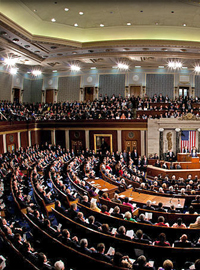| Congress Strikes Back Over Obama’s War in Libya |
 |
|
By Ashton Ellis
Thursday, June 09 2011 |
Last week’s bipartisan rebuke of President Barack Obama’s handling of the war in Libya was dismissed by a White House spokesman as “unnecessary and unhelpful.” For Americans weighing a change in leadership, it was instructive. It’s never a good day as president when a congressman representing a fraction of the national electorate sounds more authoritative on the finer points of making war. Yet that is precisely how House Speaker John Boehner (R-OH) came across in his warning to President Obama. “He has a chance to get this right. If he doesn’t, Congress will exercise its constitutional authority and make it right,” said Boehner last Friday after House Republicans passed his resolution to require a detailed report on the purpose and goals of President Obama’s unilateral war on Libya. The tough talk came after President Obama missed the 60-day deadline to get congressional approval for his ongoing war. The deadline comes from a controversial piece of legislation known as the War Powers Resolution which purports to be a control on the executive branch’s ability to make war without congressional authorization beyond a two-month limit. Originally, the War Powers Resolution was designed to limit President Richard Nixon’s command of secret bombings in Laos and Cambodia during the Vietnam War, though ever since presidents have only somewhat followed the Resolution’s requirements. Instead, commanders-in-chief prefer to “act consistent with” the act in order to retain control of operations. Nonetheless, no president since Nixon has waged so much war for so long with so little congressional approval as has President Obama in Libya. Covert operations and short-term engagements like the invasion of Grenada never reached the 60 day trip wire, while bigger actions like both Iraq wars and the invasion of Afghanistan were commenced under the aegis of specific congressional authorizations to use force. In practical political terms, an unofficial code of conduct has evolved that every president since Nixon has observed: Wrap up the conflict before time runs out; seek congressional approval when approaching the deadline; always keep the right members of Congress in the know so they can tamp down discontent. Not so for Obama. Unlike his predecessors, this president has refused repeated requests for information from individual members and relevant House and Senate committees. He even canceled appearances by Defense Department officials and a Marine General at committee hearings, instructing all to keep quiet about what’s going on in Libya. Last week’s House resolution was a flashpoint. Speaker Boehner’s resolution setting a 14-day deadline (which is really just an extension) to provide the War Powers Resolution’s missing information passed 268-145, with 30 Democrats voting in favor. A resolution by Rep. Dennis Kucinich (D-OH) calling for the withdrawal of all American troops within 15 days failed 148-265, but enjoyed the support of 61 Democrats and 87 Republicans. Since some members voted for both resolutions, the total number of representatives voting against President Obama was 324 out of the chamber’s 435 total. Neither of these resolutions carries the force of law, but the wide margin of disfavor against President Obama’s handling of his own war speaks volumes about his failure to follow either legal strictures or the unofficial code of conduct. Former Obama protégé Senator Richard Lugar (R-IN) says the president’s actions indicate his “disdain” for Congress and the rule of law. Senator Jim Webb (D-VA) – a combat veteran of the Vietnam War –this week introduced a bipartisan resolution with Senator Bob Corker (R-TN) essentially requiring the same information as stated in Boehner’s bill. As of Wednesday, Obama’s White House press secretary said the president would accede to Congress’ demands and deliver the information before Boehner’s deadline. But even if he does, the president is once again exhibiting a cynical disregard for legal requirements and reasonable inquiries. Obama’s litany of abuses toward Congress already include ObamaCare waivers for friendly labor unions, threatening an EPA endangerment finding as an end-run around cap-and-trade and creating a so-called consumer protection agency whose funding is not subject to congressional appropriations. It’s time for Congress to hit back on Obama’s executive overreach. It looks as if the president’s war in Libya may be just the place to start. |
Related Articles : |
























